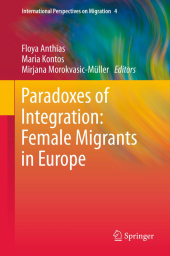 Neuerscheinungen 2014Stand: 2020-02-01 |
Schnellsuche
ISBN/Stichwort/Autor
|
Herderstraße 10
10625 Berlin
Tel.: 030 315 714 16
Fax 030 315 714 14
info@buchspektrum.de |

Floya Anthias, Maria Kontos, Mirjana Morokvasic-Müller
(Beteiligte)
Paradoxes of Integration: Female Migrants in Europe
Herausgegeben von Anthias, Floya; Kontos, Maria; Morokvasic-Müller, Mirjana
2013. 2014. viii, 204 S. 235 mm
Verlag/Jahr: SPRINGER NETHERLANDS; SPRINGER 2014
ISBN: 9400796420 (9400796420)
Neue ISBN: 978-9400796423 (9789400796423)
Preis und Lieferzeit: Bitte klicken
This comparative analysis of the lives of new female migrants in EU nations including the UK, Spain, Greece, Poland and Slovenia focuses on formal and informal labour market, including prostitution. It tracks key trends and developments in law and policy.
This timely and innovative book analyses the lives of new female migrants in the EU with a focus on the labour market, domestic work, care work and prostitution in particular. It provides a comparative analysis embracing eleven European countries from Northern (UK, Germany, Sweden, France), Southern (Portugal, Spain, Italy, Greece, Cyprus) and Eastern Europe (Poland, Slovenia), i.e. old and new immigration countries as well as old and new market economies. It maps labour market trends, welfare policies, migration laws, patterns of employment, and the working and social conditions of female migrants in different sectors of the labour market, formal and informal. It is particularly concerned with the strategies women use to counter the disadvantages they face. It analyses the ways in which gender hierarchies are intertwined with other social relations of power, providing a gendered and intersectional perspective, drawing on the biographies of migrant women. The book highlights policy relevant issues and tries to uncover some of the contradictory assumptions relating to integration which it treats as a highly normative and problematic concept. It reframes integration in terms of greater equalisation and democratisation (entailed in the parameters of access, participation and belonging), pointing to its transnational and intersectional dimensions.


